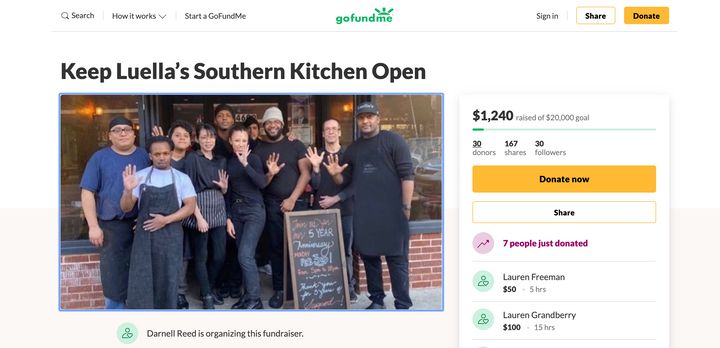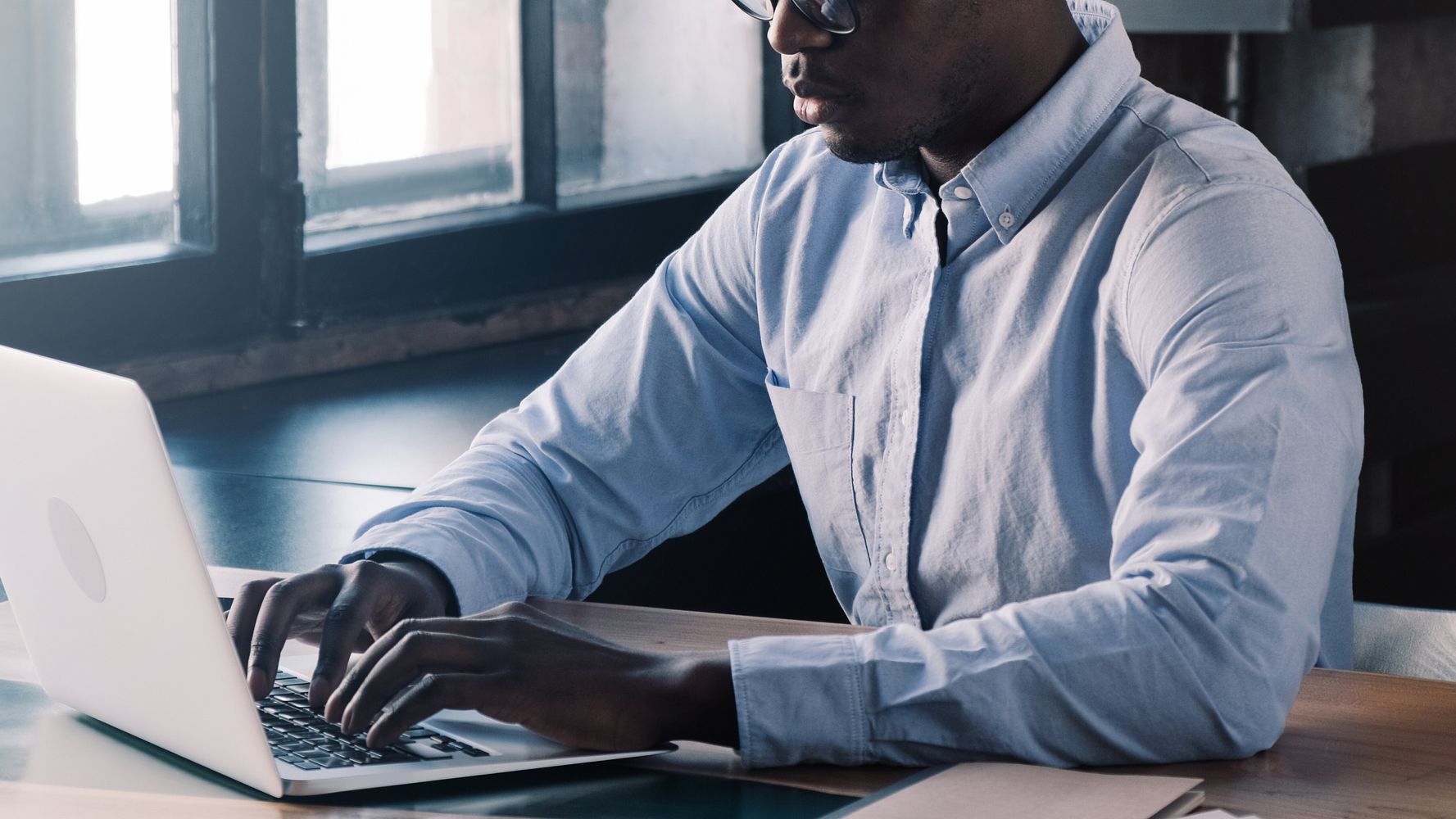[ad_1]
Naj Austin launched a digital subscription for Ethel’s Club members on March 20, days after temporarily shutting its doors during the novel coronavirus outbreak. The day after, personal trainer Irving “Zeus” Hyppolite hosted his first boot camp workout on Instagram Live. And Darnell Reed, owner of two restaurants, has had to temporarily close one of his businesses and lean on other Black restaurateurs in his community to keep business flowing.
These entrepreneurs, like many business owners across the country, are finding ways to ease the financial strain caused by COVID-19. Since the World Health Organization officially named the outbreak a pandemic on March 11, the economy has taken a big hit. Workers across the country have faced layoffs and businesses have had to close their doors. The health crisis has especially created a looming threat for Black business owners who make up only 4.3% of business owners in the country and are at a disproportionate disadvantage when it comes to securing small-business loans.
“There’s this old saying, ‘When America catches a cold, Black America catches pneumonia,’” Ron Busby, president and CEO of the United States Black Chambers Inc., told HuffPost.
But despite the economic downturn, Black entrepreneurs across the country are working to find new ways to adapt in the era of social distancing.
“I’m hearing from people that are already feeling the crunch and are even going to feel it more in the next couple of weeks,” Busby said. “But I’m excited that our firms that are prepared, are taking this time to be locked away in their own homes, are really trying to think about their businesses and how they’re going to come out of this.”
Ryan Wilson and TK Petersen, owners of The Gathering Spot in Atlanta, have had to make a huge shift in the way they approach community. Within the past year, the duo have hosted nearly 2,400 events at its base and worked toward opening locations in Washington, D.C., and Los Angeles. Mandates to close nonessential businesses caused them to close the doors to their social club and serve food only via takeout and delivery at the club’s restaurant. Their losses from March, April and potentially May will be significant, Wilson told HuffPost. Although it’s a difficult time, their members and over 100 employees are their priority right now, he said.
“The effort on that front has been to continue to pay and offer employee benefits for our team,” Wilson said, adding that they’d just started an effort to continue to provide meal services to members who can pick up food while their locations are closed to the public. “So we’re trying to care for our folks because it’s unprecedented I think for everybody.”
Recently, The Gathering Spot opened a virtual portal where their members can access discussions and watch parties and other events digitally. On Friday, they hosted a series of roundtables on how COVID-19 is affecting businesses and what steps owners could take to minimize the effects.
Similarly, Austin of Ethel’s Club wants to make sure her members have access to virtual services. With New York’s rapid rise in coronavirus cases, the Brooklyn-based social club decided to shut its doors ahead of the mandate and have been closed for a little over two weeks. She told HuffPost that, though her team of less than 10 employees has been working from home, it almost feels like business as usual.
“We’re still trying to create that same kind of intentional, empowering community that we do within the clubhouse and online. We’re still trying to be a platform for creators and artists and makers to have a place where they can do their thing and then get paid for it,” she said. “So we’ve honestly just sort of changed the medium but have done all of the same things we’ve always done, which I think has actually been very helpful amidst all of the unknowns. Being able to show up and do your job every day in the way that you’ve always done it is a weird blessing in disguise.”
Austin said the goal for her and her team with the digital membership is to help give members who are working from home a sense of structure. Each day, they have content that goes live at 3 p.m. and 6 p.m. EDT, ranging from meditation, yoga and breathwork, discussions around art and music, and cooking shows. The clubhouse has also waived membership dues for April. Austin told HuffPost that financial loss and membership growth are certainly concerns, but they are taking all of the uncertainties one day at a time.
Things can be a bit more complicated for business owners who work in fields where person-to-person contact is essential. Busby said times of crisis can take the biggest toll on these kinds of businesses.
Initially, Hyppolite didn’t know what his next steps would be when New York mandated that all gyms close. It took the independent trainer a few days to process how he’d be able to continue to serve his clients and provide for his family. He pivoted to training his clients one-on-one in parks and checking in with them virtually to make sure they stay on track with their health goals.
He’s also transitioned his weekly Inner U Bootcamp to Instagram Live, which is donation-based but reaching a wider circle of clients. Hyppolite has found success in his business by building a community around health. That’s especially significant because many of his clients are entrepreneurs and freelancers of color whose work has also been affected by COVID-19. The trainer said that his clients aren’t taking the sense of community he’s built for granted.
“I have been fortunate enough to have a support system through what I’ve created, where we’ve been able to bounce ideas back and forth on ways to go around what’s going on,” he told HuffPost.
“I think that’s a beautiful thing and brings a lot of optimism to how to push through the next couple months or whatever this is going to be like,” he added. “So a friend of mine, we both say, ‘Flowers don’t grow without rain.’ And what happens in moments like this is now we finally get to grow flowers, right? Because out of all of this, you’re going to create something amazing. Now it’s going to force us to expand our mind into doing things that we was scared to do or we didn’t think we could do. Or we didn’t even have on the radar before.”
In the wake of this crisis, more and more entrepreneurs are turning to Instagram Live to connect with their clientele. Hairstylist Brittany Crawford just hosted her first live show on Tuesday where she offered tips and product knowledge to her clients.
Her salons, SnatchGang Studio and SnatchGang Suites in Oakland County, Michigan, which sits outside of Detroit, followed the state mandate to temporarily close its doors. Crawford, who recently found out her 84-year-old grandmother tested positive for COVID-19, had to reduce the amount of rent for her 10 stylists at both businesses due to the decrease in clientele leading up to the mandate. Before they closed, however, Crawford was in the shop until the final hours, making sure her clients’ hair was flawless.
She isn’t making money right now, and bills are racking up. In the meantime, she’s doing what she can to keep her clients and hoping that things will turn around in April, noting the need for the women she services, especially those in the medical field, who are still going to work.
Reed, who owns Luella’s Southern Kitchen and Luella’s Gospel Bird in Chicago, created a GoFundMe to help keep the business operational. Because they’re considered an essential business, Reed has been able to continue to keep his nine employees at Luella’s Southern Kitchen working while offering only takeout and delivery. He’s had to temporarily close Luella’s Soul Bird, however, which has affected seven employees. He thinks they may have to shut the doors to Gospel Bird permanently.

Reed has been seeing the biggest decline on Saturdays and Sundays, days that would normally be a big draw for brunch. He said the restaurant made only about 10% of its usual revenue on both days combined. The owner isn’t feeling defeated, however. He said the Black-owned restaurants in the city have been sharing advice and best practices for riding out this pandemic. Reed has introduced gift cards and will be announcing specials soon so that they’re able to keep business rolling. He also has been taking culinary classes online to prepare to bounce back as best as he can.
“When we come back, I want to come back stronger than ever, so let me sharpen whatever I feel like I needed some work on, what skill to work on. At least focus on that and work on those exact skills,” he told HuffPost.
But not all businesses are struggling. OneUnited, the largest Black-owned bank in the country, has actually seen a boom in business since the start of the pandemic. President and CEO Teri Williams told HuffPost that there’s been an increase in their virtual banking.
“To some degree, we’ve seen a positive impact, and I say this cautiously, because it’s still early, but we think that people are becoming much more comfortable with doing business online,” Williams said. “We’re seeing an increase in customers. Also, people are trying not to go into branches. Our online business is actually growing, but it’s early in this whole experience.”
She said OneUnited, which is headquartered in Boston, is working to move more of its customers to online banking and keep their 110 employees healthy during the crisis.
Most of these business owners will benefit from the stimulus package signed by President Donald Trump on Friday, which includes $370 billion for small businesses. Small business owners will receive money in the form of a loan, which wouldn’t need to be paid back if it’s used for employees’ salaries, mortgage, rent or utilities, Busby explained. The package also allocates $10 million for grants to minority-owned businesses. He said that, though times are turbulent and uncertain, Black businesses that are prepared with tax and income documentation will be able to recover. He advises owners to prepare for an 18- to 21-day window to get their funding, which may be tough for owners like Crawford, who’s already had to dip into her savings.
Additionally, private companies have begun offering avenues of relief for Black business owners. Kerby Jean-Raymond, founder of the menswear line Pyer Moss, for example, announced that the company is offering $50,000 for minority- and female-owned creative businesses that are struggling to keep afloat. The Gathering Spot is also offering $15,000 in relief funding to local small businesses in Atlanta.
On top of aid, Busby said that it’s crucial that the public support Black-owned businesses. “We need to more so than ever right about now.”
A HuffPost Guide To Coronavirus
Calling all HuffPost superfans!
Sign up for membership to become a founding member and help shape HuffPost’s next chapter
[ad_2]
Source link

